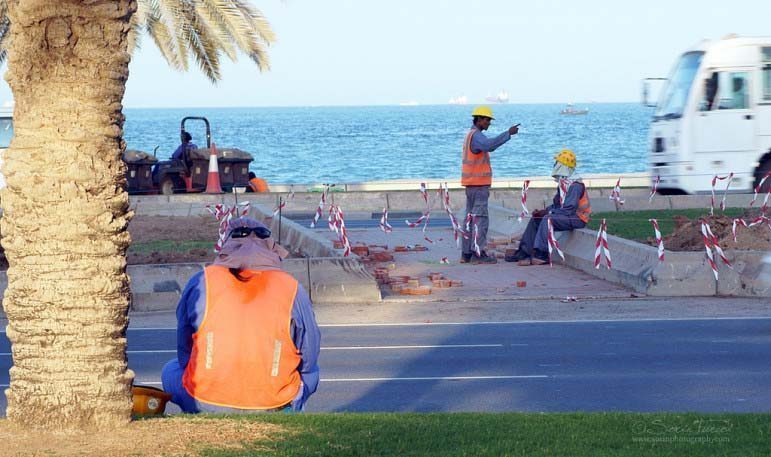
Qatar has not taken concrete steps to end the widespread exploitation of migrant workers in the four years since it won the 2022 World Cup hosting rights, Amnesty International has said in a new report – adding that time is running out for meaningful change to be implemented.
Earlier today, the human rights organization released its assessment of the country’s efforts to improve the living and working conditions of foreign laborers, a topic of international scrutiny in the run-up to the international football tournament.
Local researchers estimate there are some 700,000 foreign laborers in Qatar, working low-income jobs in the country’s oil and gas, construction and manufacturing sectors.
That figure is expected to grow rapidly in the coming years and major infrastructure and real estate development projects pick up steam.

While there have been promises of new laws to protect migrant workers from abuse at the hands of their employers, little has changed on the ground in Qatar, Amnesty said.
Still, the group credited Qatar’s political leaders for openly acknowledging that problems exist.
The report for example referenced remarks made by the Emir, who said in an interview on CNN earlier this year that he was “personally hurt about the situation” faced by laborers in Qatar.
“That was a watershed moment, and we shouldn’t downplay that,” Amnesty researcher James Lynch told Doha News. “But it is the first stage, and haven’t seen it followed it up … We have serious concerns whether there is political will to deliver the kind of solutions that are ultimately necessary to address this problem.”
Running out of time
Amnesty, the United Nations and international law firm DLA Piper have all investigated allegations of worker mistreatment within the last year and made similar recommendations to Qatar’s leaders.

These include abolishing the exit permit system, reviewing Qatar’s sponsorship (kafala) system and ensuring workers are paid by their employers. According to Amnesty’s scorecard, no actual progress has been made in addressing any of these issues.
This is despite the fact that in May, the government announced wide-ranging reforms to the country’s labor laws, namely giving the Ministry of Interior authority to issue exit permits instead of sponsors, and limiting an employer’s power to block their employees from taking a new job.
The changes were widely panned by critics for not going far enough and, six months later, no legislation has been passed.
This week, officials have suggested that the changes, which also include requiring companies to pay workers by direct bank deposit so that late or non-existing payments can be documented, could come into effect later this year or in 2015.
“We have emotions, we feel bad,” Salah bin Ghanem bin Nasser al-Ali, Qatar’s sports minister, recently told the Associated Press.
He noted his own father worked as a 12-year-old laborer in the oil industry in “very hard conditions” that today “would be like child abuse.”

“We understand this problem. For us, it’s a human question,” he told the news agency. Qataris, he added, aren’t “vicious people who are like vampires.”
Still, Lynch said there appears to be a lack of urgency on the government’s part to roll out changes. That’s problematic because construction of stadiums, expressways and real estate projects – as well as the number of foreign laborers in Qatar – is expected to peak in the coming years.
“Time has almost run out for Qatar to deliver a World Cup that is not built on exploitation of workers,” Amnesty stated in its report.
In other areas, the human rights organization said Qatar has made partial or limited progress. This includes:
- Promising to publish the names of recruitment companies that repeatedly violate local laws;
- Introducing a multilingual electronic labor complaint system;
- Building health facilities closer to work sites;
- Phasing expats into Qatar’s national health insurance scheme (Seha); and
- Hiring more labor inspectors.
Domestic workers
Away from the country’s construction sites, Amnesty notes that no action has been taken to better protect female domestic workers in Qatar.

Earlier this year, the organization published a report that found maids, nannies and other domestic helpers often face long working hours, violence, wage deductions or non-payment, confiscation of their passports, restrictions on leaving the property and verbal abuse.
According to Lynch, a draft law to protect domestic workers has been in discussion since 2008. Six years later, GCC states are still talking about plans to introduce new legal measures.
“People should treat announcements without timelines, without clarity in the proposals, with a degree of caution,” he said.
Thoughts?







